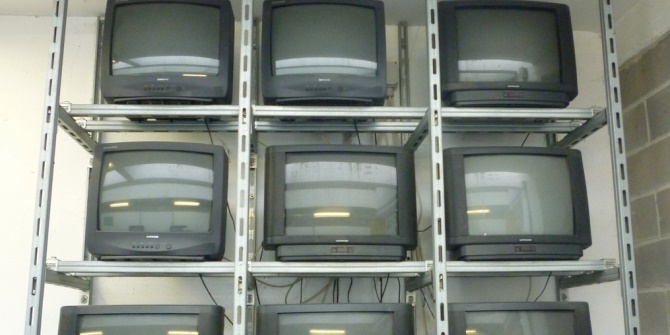 This post was originally posted on Charlie Beckett’s blog on April 22nd.
This post was originally posted on Charlie Beckett’s blog on April 22nd.
Charlie Beckett is the Director of POLIS.
The fact that no-one knows with any degree of certainty how this election will turn out is a profound reflection of just how significant it has become. Now take a minute or two to think about what might result after May 6th and you realise that the stakes are enormous. So tonight’s TV debate is at least the location, if not the actual mechanism for a moment of potentially seismic significance, as predicted by Adam Boulton some weeks ago.
 I have suggested that the Clegg surge will abate, but what if it doesn’t or if it only retreats a little?
I have suggested that the Clegg surge will abate, but what if it doesn’t or if it only retreats a little?
It is now within the realms of the possible, even likely, that we will end up with no overall majority. That in turn could lead to a referendum on PR. It’s likely that both Labour and the Lib Dems would back a system such as AV and so the political landscape could change forever. Coalitions would become the norm, not a war-time exception.
So if Clegg can keep his momentum going tonight then it is not just going to transform this campaign, but also the country. It depends which opinion poll you follow but in crude terms I think that if the Lib Dems’ poll ratings are still in the 25-28% range on Sunday then I suspect the surge is sustainable enough to deliver near to 25% in the final poll, thus delivering no majority for the Conservatives. [But what do I know? three months ago I was going for a 50 seat majority for the Tories]
The critical question is firstly this: To what degree will the public voting for Clegg in those terms instead of as a protest vote? And secondly, if they see it in those more constitutional terms, will they welcome the chance to turn Britain’s political system on its head?
This all feels at least as revolutionary as the arrival of the SDP 29 years ago. Media was critical then, too, as much of Fleet Street and broadcasting fell in love with the telegenic, PR-conscious Gang of Four. They surged to opinion poll ratings of 50%+ and won 25% of the vote in 1983. Still, we all remember what happened to that particular new dawn.





